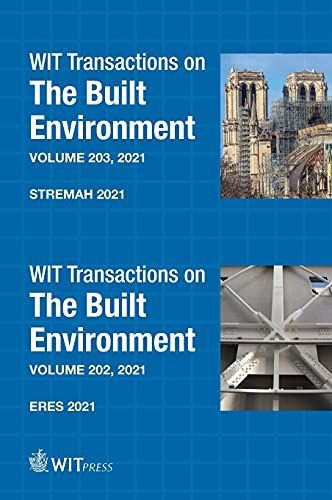
Structural Studies, Repairs and Maintenance of Heritage Architecture XVII & Earthquake Resistant Engineering Structures XIII
Structural Studies, Repairs and Maintenance of Heritage Architecture XVII The importance of retaining the built cultural heritage cannot be overstated. Rapid development and inappropriate conservation techniques are threatening many heritage unique sites in different parts of the world. Selected papers presented at the 17th International Conference on Studies, Repairs and Maintenance of Heritage Architecture are included in this volume. They address a series of topics related to the historical aspects and the reuse of heritage buildings, as well as technical issues on the structural integrity of different types of buildings, such as those constructed with materials as varied as iron and steel, concrete, masonry, wood or earth. Restoration processes require the appropriate characterisation of those materials, the modes of construction and the structural behaviour of the building. This knowledge can be gained through a series of material characterisation techniques, preferably via non-destructive tests. Modern computer simulation can provide accurate results demonstrating the stress state of the building and possible failure mechanisms affecting its stability. Of particular importance are studies related to their dynamic and earthquake behaviour aiming to provide an assessment of the seismic vulnerability of heritage buildings. Contributions originate from scientists, architects, engineers and restoration experts from all over the world and deal with different aspects of heritage buildings, including how to formulate regulatory policies, to ensure effective ways of preserving the architectural heritage. Earthquake Resistant Engineering Structures XIII Papers presented at the 13th International Conference on Earthquake Resistant Engineering Structures form this volume and cover basic and applied research in the various fields of earthquake engineering relevant to the design of structures. Major earthquakes and associated effects such as tsunamis continue to stress the need to carry out more research on those topics. The problems will intensify as population pressure results in buildings in regions of high seismic vulnerability. A better understanding of these phenomena is required to design earthquake resistant structures and to carry out risk assessments and vulnerability studies. The problem of protecting the built environment in earthquake-prone regions involves not only the optimal design and construction of new facilities but also the upgrading and rehabilitation of existing structures including heritage buildings. The type of highly specialized retrofitting employed to protect the built heritage is an important area of research. The included papers cover such topics as Seismic hazard and tsunamis; Building performance during earthquakes; Structural vulnerability; Seismic isolation and energy dissipation; Passive earthquake protection systems.